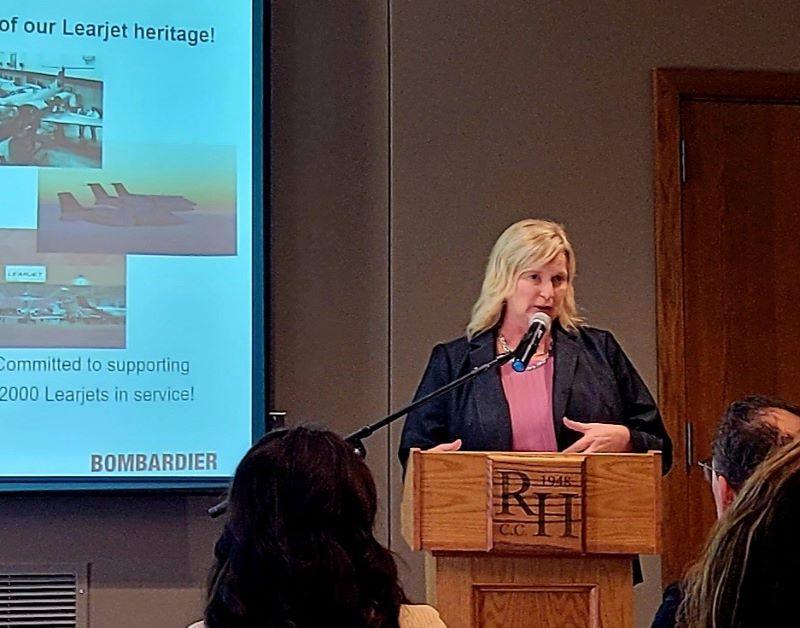
WICHITA—A year has passed since Bombardier designated its Wichita site as its U.S. headquarters following the halt of Learjet production.
Since then, the company has reconfigured operations and concentrated on its flight test center and on growing its service and defense business here. It also has increased jobs.
After the departure of the Learjet, many Wichitans figured the site, which opened in 1962, would close. The last Learjet, a Learjet 75, departed Wichita in March 2022 after 60 years of continuous production.
In the past year, the company has worked hard to calm those fears. In April 2022, Bombardier announced Wichita as its U.S. headquarters.
“This was really, really good news for Wichita, showing the commitment of Bombardier as we go forward in this community,” Tonya Sudduth, Bombardier head of U.S. strategy, said recently during a Wichita Aero Club luncheon in a keynote speech. Sudduth has led the Wichita facilities since 2015. “When you look at Bombardier’s strategic priorities, Wichita is key to helping Bombardier succeed and position well for growth.”
The medium and large segments of the business jet industry are predicted to grow, while the light jet market is projected to decline, Sudduth notes. As it ended Learjet production, Bombardier also sold its commercial aircraft and rail divisions, resulting in a pureplay business jet company focused on its Challenger and Global lines of aircraft.
The change has been a plus for the Montreal-based company.
“Things are banging on all cylinders for Bombardier lately, who in an effort to survive a previous bad bet on jetliners shed all of its business units except business jet manufacturing,” Brain Foley, a consultant with Brian Foley Associates, said recently. “Slimming down from a multinational conglomerate to a one-trick pony with a crushing $9 billion debt load would seem like the beginning of the end, but during its two years the reconstituted company has proven otherwise.”
Bombardier employs about 2,800 in the U.S., including more than 1,200 in Wichita. The company was able to retrain and retain nearly all Wichita employees based on the Learjet line to other areas in the facility, Sudduth says. It also added 230 net new jobs in the past year.
The Wichita facility spans more than a million square feet and houses 15 hangars, which are jam packed, she says. Its service center, which serves Learjet, Challenger and Global aircraft, occupied three hangars just five years ago. It now occupies seven hangars. In 2022, the Wichita service center, Bombardier’s oldest, serviced 500 aircraft.
Bombardier’s in-service fleet totals about 5,000, including 2,000 Learjet light business jets.
Bombardier’s flight test center, which opened in 1990, is also located in Wichita, she notes. There, flight test pilots test all Bombardier products, including the Global 7500 and Global 8000. As such, it supports all programs and upgrades, Sudduth notes.
Bombardier’s growing defense business, based in Wichita, is an important piece of the company’s portfolio, she says. In April 2022, Bombardier changed the name of its Specialized Aircraft division to Bombardier Defense.
“Geopolitical tensions and international security concerns have accelerated demand for sure in this segment,” Sudduth says. Bombardier’s Global 6000 has proven ideal because of its long-range, 12-hr. flight duration, high altitude performance and lower operating costs.
Bombardier has secured a long-standing, seven-aircraft contract with the U.S. Air Force’s Battlefield Airborne Communications Node program, designated as E-11As in the military. The aircraft serve as high-altitude communication gateways for troops in the sky to communicate with troops on the ground. Wichita performs the structural modifications and provides support for the aircraft.
The Wichita site also supports the Pegasus program, a European work package announced in 2022. The aircraft collects and analyzes military signals from radio and radar systems. And it supports the GlobalEye Airborne Early Warning and Control solution, which provides situational awareness of surrounding areas and early detection of threats.
“What’s really cool about the defense programs is it’s the entire lifecycle of the aircraft that we’re supporting,” Sudduth says, “beginning with the program development, engineering services to delivery both green and the aircraft mods. And then once it’s in service, the operations and sustainment ... Products today still come back to Wichita for their maintenance work.”
The Wichita facility’s biggest challenge is in the recruitment of workers. The facility has openings for about 90 positions ranging from technicians to engineers.
“I think our opportunity to continue to grow our service centers is endless to a large extent,” Sudduth says. “We could still maximize shifts; we could do so much more. It’s all about talent recruitment right now. The more people we can get in the door, the more business. I’m confident the business is there. I want to capture more of it, and I need the technicians to make it happen.”
Sudduth does not foresee major changes to the Wichita facility in the future, however.
“I think the main business units will remain the same,” she says. “The hangars are what I would describe as busting at the seams right now. They’re all full between services as well as defense. So, we’ll continue to have I’m sure, some real estate challenges.”
But before it solves real estate challenges, “I think it’s more a matter of maximizing those shifts,” she says. “We’ve got to get the talent in the door. I think we’re in a pretty good position to sustain the growth with what we have as we go forward.”





